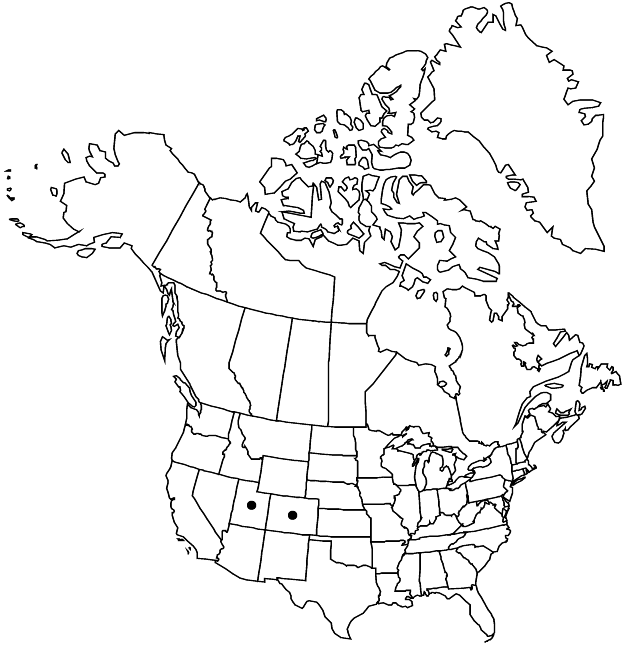Difference between revisions of "Eriogonum contortum"
Fl. Colorado, 104, 107. 1906.
FNA>Volume Importer |
FNA>Volume Importer |
||
| Line 27: | Line 27: | ||
|elevation=1300-1700 m | |elevation=1300-1700 m | ||
|distribution=Colo.;Utah. | |distribution=Colo.;Utah. | ||
| − | |discussion=<p>Eriogonum contortum is localized on Mancos Shale in Grand Valley of eastern Grand County, Utah, and western Mesa County, Colorado. Disjunct populations occur just outside Grand Valley in Garfield County, Colorado, and in Emery County, Utah. In Colorado, the Bureau of Land Management considers it a “sensitive” species. The Badger Wash Natural Area has been established to protect this species along with Astragalus musiniensis M. E. Jones (Ferron milkvetch) and Cryptantha elata Payson (tall cryptanth). Grand Valley wild buckwheat occasionally is seen in rock gardens. It is related to E. brevicaule var. brevicaule but shares many characters in common with E. pelinophilum, most notably a flower that in fruit has its proximal half decidedly rounded due to its close adherence to the globose base of the achene.</p> | + | |discussion=<p><i>Eriogonum contortum</i> is localized on Mancos Shale in Grand Valley of eastern Grand County, Utah, and western Mesa County, Colorado. Disjunct populations occur just outside Grand Valley in Garfield County, Colorado, and in Emery County, Utah. In Colorado, the Bureau of Land Management considers it a “sensitive” species. The Badger Wash Natural Area has been established to protect this species along with Astragalus musiniensis M. E. Jones (Ferron milkvetch) and Cryptantha elata Payson (tall cryptanth). Grand Valley wild buckwheat occasionally is seen in rock gardens. It is related to <i>E. brevicaule </i>var.<i> brevicaule</i> but shares many characters in common with <i>E. pelinophilum</i>, most notably a flower that in fruit has its proximal half decidedly rounded due to its close adherence to the globose base of the achene.</p> |
|tables= | |tables= | ||
|references= | |references= | ||
| Line 51: | Line 51: | ||
|publication year=1906 | |publication year=1906 | ||
|special status= | |special status= | ||
| − | |source xml=https://jpend@bitbucket.org/aafc-mbb/fna-data-curation.git/src/ | + | |source xml=https://jpend@bitbucket.org/aafc-mbb/fna-data-curation.git/src/8f726806613d60c220dc4493de13607dd3150896/coarse_grained_fna_xml/V5/V5_513.xml |
|subfamily=Polygonaceae subfam. Eriogonoideae | |subfamily=Polygonaceae subfam. Eriogonoideae | ||
|genus=Eriogonum | |genus=Eriogonum | ||
Revision as of 17:39, 18 September 2019
Herbs, spreading, not scapose, 0.5–0.8(–1) × 0.8–3.5 dm, thinly floccose or glabrous, greenish. Stems spreading, occasionally with persistent leaf bases, up to 1/3 height of plant; caudex stems matted; aerial flowering stems slightly spreading to erect, slender, solid, not fistulose, 0.2–0.6 dm, thinly floccose or glabrous, tomentose among leaves. Leaves sheathing up stem 1–4 cm, 1 per node; petiole 0.1–0.2 cm, glabrous or sparsely floccose; blade linear to narrowly lanceolate, (0.5–)1–2(–2.5) × 0.15–0.2(–0.25) cm, densely white-tomentose abaxially, floccose and greenish adaxially, margins revolute. Inflorescences cymose, 1–3 × 0.8–2 cm; branches dichotomous, thinly floccose or glabrous; bracts 3, scalelike, triangular, (0.5–)1–2 mm. Peduncles erect, slender, 0.2–1 cm, floccose or glabrous. Involucres 1 per node, turbinate to turbinate-campanulate, 1.5–2(–2.5) × 1–2 mm, glabrous; teeth 5, erect, 0.3–0.5 mm. Flowers 1.5–2.5 mm; perianth yellow, glabrous; tepals connate proximal 1/2, monomorphic to slightly dimorphic, those of outer whorl slightly broader than those of inner whorl, oblong to obovate; stamens exserted, 1.5–2 mm; filaments pilose proximally. Achenes brown, 2–2.5 mm, glabrous.
Phenology: Flowering May–Aug.
Habitat: Heavy shale or clay flats and slopes, saltbush communities
Elevation: 1300-1700 m
Discussion
Eriogonum contortum is localized on Mancos Shale in Grand Valley of eastern Grand County, Utah, and western Mesa County, Colorado. Disjunct populations occur just outside Grand Valley in Garfield County, Colorado, and in Emery County, Utah. In Colorado, the Bureau of Land Management considers it a “sensitive” species. The Badger Wash Natural Area has been established to protect this species along with Astragalus musiniensis M. E. Jones (Ferron milkvetch) and Cryptantha elata Payson (tall cryptanth). Grand Valley wild buckwheat occasionally is seen in rock gardens. It is related to E. brevicaule var. brevicaule but shares many characters in common with E. pelinophilum, most notably a flower that in fruit has its proximal half decidedly rounded due to its close adherence to the globose base of the achene.
Selected References
None.
